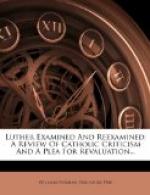Of Sixtus IV he says: “His chief motive was the small ambition to raise his family from their low estate to the highest rank.” Infamous transactions which resulted in the murder of Julian de Medici while at high mass in church and the hanging of the archbishop of Pisa from a window of the town hall by the exasperated people, wars, conspiracies, alliances, annulments of alliances, in short, all the acts that fill up the turbulent life of a crafty and grasping politician, are recorded for his administration. He did not scruple to employ the authority of his exalted office for the furtherance of his political schemes. Thus he excommunicated Venice and formed a warlike alliance against the city. But the Venetians regarded his religious thunderbolts as little as his physical prowess. “Vexation at this hastened the death of the Pope, who was hated as much as he was despised.”
Ranke, on the authority of Alegretti, relates of Pope Sixtus IV: “The Colonna family, opponents of the Pope’s nephew Riario, was persecuted by him with the most savage ferocity. He seized on their domain of Marino, and causing the prothonotary Colonna to be attacked in his own house, took him prisoner, and put him to death. The mother of Colonna came to St. Celso, in Banchi, where the corpse lay, and lifting the severed head by its hair, she exclaimed: ’Behold the head of my son. Such is the truth of the Pope. He promised that my son should be set at liberty if Marino were delivered into his hands. He is possessed of Marino, and, behold, we have my son—but dead. Thus does the Pope keep his word.’”
His successor, Innocent VIII, “in defiance of the conditions of his election, sought with a still more profligate vileness to exalt and enrich his seven illegitimate children.” He had been elected on the condition that he would make only one blood relative a cardinal, and that certain other benefices of the Church should not be given to any one related to him. The people called him Nocens (the Guilty One, or the Harmful One) instead of Innocent, and immortalized the prolific paternity of this saintly celibate in the following epigram:
Octo Nocens genuit pueros
totidemque puellas,
Hunc merito poterit
dicere Roma patrem,
that is,
Nocens begat eight boys
and an equal number of maidens;
Rightly, then, Rome
will be able to call this gentleman father.
“He carried on two wars with Ferdinand, king of Naples, until the year 1492, and brought forward Renatus, duke of Lorraine, as pretender to his crown. True, he proceeded, as his predecessors had done, to encourage princes and people to undertake expeditions against the Turks; but when Dschem, the brother and rival of the Turkish Sultan Bajazet, was delivered over to him at the head of an army against the Turks, he chose rather to detain him in prison on consideration of an annual tribute from the Turkish Sultan.” The story how the Pope got possession of the Turkish prince and refused 200,000 ducats ransom for him because he had received an offer of 600,000 from another party, reads like a story of professional brigandage.




